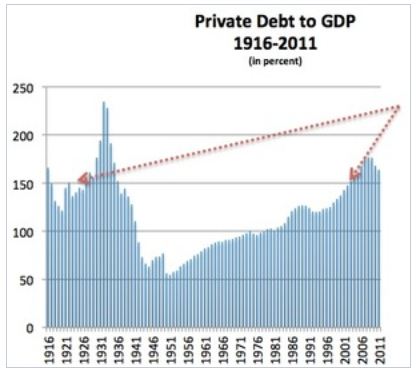Why Not Push the Pentagon off the Fiscal Cliff?
Here's my initial estimate: zero.
 Reasons to Have Kids (Besides Preserving U.S. Hegemony)
Reasons to Have Kids (Besides Preserving U.S. Hegemony)

Robert Wright is a senior editor at The Atlantic and the author, most recently, of The Evolution of God, a New York Times bestseller and a finalist for the Pulitzer Prize. More
Robert Wright is a senior editor at The Atlantic and the author, most recently, of The Evolution of God, a New York Times bestseller and a finalist for the Pulitzer Prize. Wright is also a fellow at the New America Foundation and editor in chief of Bloggingheads.tv. His other books include Nonzero, which was named a New York Times Book Review Notable Book in 2000 and included on Fortune magazine's list of the top 75 business books of all-time. Wright's best-selling book The Moral Animal was selected as one of the ten best books of 1994 by The New York Times Book Review.Wright has contributed to The Atlantic for more than 20 years. He has also contributed to a number of the country's other leading magazines and newspapers, including: The New Yorker, The New York Times Magazine, Foreign Policy, The New Republic, Time, and Slate, and the op-ed pages of The New York Times, The Washington Post, and The Financial Times. He is the recipient of a National Magazine Award for Essay and Criticism and his books have been translated into more than a dozen languages.
Here's my initial estimate: zero.

That's the view of some analysts whose voices aren't getting much airtime amid all the freaking out about the fiscal cliff. They say that private debt--mortgages, credit card bills, business loans, etc.--is a much bigger problem than public debt, and we're going to have to confront it before we truly recover from the great recession.
This summer my Atlantic colleague Steve Clemons published a report on this subject--co-authored with entrepreneur Richard Vague, and based on data Vague had collected. It makes for bracing, and sometimes scary, reading. Especially when you realize that, as Financial Times columnist Edward Luce notes in discussing the Clemons-Vague paper, private debt is "higher as a share of America's GDP than anywhere in Europe."


According to former Israeli Prime Minister Ehud Olmert, Bibi Netanyahu has delivered "the worst possible slap in the face" to President Obama. Olmert was referring, of course, to Netanyahu's announcement that Israel will proceed with a settlement project that, the New York Times reported, "has long been condemned by Washington as effectively dooming any prospect of a two-state solution." (An article in the Israeli newspaper Haaretz seconds Washington's assessment--see headline above.)
Olmert may be overstating things, but not by much. Certainly Netanyahu's settlement surprise isn't the show of gratitude Obama had reason to expect after the US voted with Israel against Palestine's bid for nonmember observer status at the UN--a bid so reasonable and innocuous that Israel and the US, in opposing it, were in a minority of 9 out of 147 voting nations. And some of those 9 were on our side only because of American arm twisting. (Olmert himself thought it was a mistake for Israel to oppose the resolution.)
In a way this was more than a slap at Obama. It was a slap at the United States. Terrorism is one of America's main national security threats, and the hatred of America by some Arabs and Muslims is the most valuable asset terrorist recruiters have. So stoking that hatred by voting to thwart the legitimate aspirations of Palestinians makes America less secure. To put a finer point on it: Stoking that hatred makes our children more likely to die a violent death 5, 10, 15 years from now.
But I haven't given up on the Burns meme! (Maybe it's, as they say, a slow burns.) Meanwhile, in the interest of fairness, I'll air some of the other names that are being mentioned for the job.
Interestingly, a few of them are Republicans. Josh Rogin reports at Foreign Policy that the administration is vetting Chuck Hagel for a national-security post, possibly secretary of defense or secretary of state. And Jim Lobe of Lobelog mentions several Republican prospects -- Richard Lugar, Bob Zoellick, and Jon Huntsman.
I like the idea of a Republican secretary of state, and it's the kind of thing Obama would probably like. But let's face it: Lugar is 80, Hagel isn't very articulate, and a Zoellick pick would violate the unspoken never-choose-a-secretary-of-state-with-an extremely-thin-moustache rule. And as for Huntsman: he used his last Obama administration diplomatic post -- ambassador to China -- to launch a presidential campaign. Nothing inherently wrong with that, but it took the form of amping up provocative rhetoric toward China as he was leaving his post. Sometimes provocative rhetoric is in order, even from an ambassador, but to trot it out for personal political reasons strikes me as cheap and deeply irresponsible. Besides, Huntsman reminds a little of the character Leland Palmer on the old TV show Twin Peaks. And [spoiler alert!] Leland, it turned out, killed Laura -- his own daughter.
The one candidate that no one seems to be advocating is Susan Rice. And I don't think that's just because of the political obstacles she faces. My sense is that pretty much nobody thinks she'd do a good job as secretary of state.
One of the more full-throated endorsements of Rice I could find was on this website, where Jeffrey Goldberg went so far as to say she'd make a "plausible" secretary of state. Granted, he said, "She's brittle, she's inexperienced, she lacks the stature to challenge President Obama, and she is no great foreign policy genius." And, granted, during the Benghazi turmoil "she should have been more careful about what she said when she said it." (But, hey, so what if your secretary of state goes around the world saying ill-advised things?) Still, he said, Rice does have some redeeming features. For example, "She has had some very public failures. A secretary of state nominee -- anyone in high office, really -- should have some experience with failure, and she has it." So there's that.
Kerry would by most accounts make a fine secretary of state. Certainly, as James Traub recently noted, he's got the visuals down -- solemn, suave, tall, etc. Plus, he's well-traveled and knows a lot about the world beyond America's borders.

But there's that nagging downside to moving Kerry out of the Senate: Now that Massachusetts Senator Scott Brown has lost his reelection bid, he lurks as the likely Republican candidate in the special election that would be held to fill Kerry's seat -- and, unlike other Republican politicians in Massachusetts, he could actually win. Indeed, conspiracy theorists have suggested that the Republican opposition to Rice is motivated partly by a desire to turn Kerry's seat in the Senate from blue to red.
And Kerry wouldn't be vacating just any old seat, but the seat that holds the chairmanship of the Foreign Relations Committee, which he occupies very ably. Robert Menendez of New Jersey would be in line to fill that spot -- a prospect that, according to reporter Laura Rozen, is viewed dimly in the White House because "the White House has a lot of problems with Menendez on foreign policy issues."
With Rice's nomination in doubt and a Kerry nomination having so much practical downside, maybe it's time to consider a third candidate? And who should that be? I'm not qualified to say -- I don't keep close track of all the D.C. foreign-policy players. But a couple of weeks ago, I did an informal email poll of people I know who keep closer track. And the favorite candidate, by a large margin, was William Burns, currently deputy secretary of state.
The Hamas-as-Iranian-puppet narrative gets help from American media. Consider, for example, this week's New York Times piece by David Sanger and Thom Shanker asking what the recent Israel-Gaza conflict tells us about how a possible war with Iran might play out. Referring to Netanyahu and President Obama, Sanger and Shanker write:
And one key to their war-gaming has been cutting off Iran's ability to slip next-generation missiles into the Gaza Strip or Lebanon, where they could be launched by Iran's surrogates, Hamas, Hezbollah, and Islamic Jihad, during any crisis over sanctions or an Israeli strike on Iran's nuclear facilities.
The confident assertion that Hamas is an Iranian "surrogate"--a claim Sanger and Shanker never get around to substantiating--is oddly out of touch with recent developments in the region.
Meanwhile, if you're wondering where to turn for background information about the blockade, I have this guidance: stay as far away from mainstream media as possible.
Warning: Before you click 'play' on this video, I recommend that you turn the volume down, because the music is jaw-droppingly hokey. Aside from that, though, I think this is pretty cool--a kind of time-lapse emotional thermometer of the United States as it endured Hurricane Sandy. The video is based on a computer analysis of the "location, intensity, and tone" of Sandy-related tweets, according to the Facebook page for the Global Twitter Heartbeat project (a collaboration between the University of Illinois and Silicon Graphics International). Second warning: They freeze the action right before Sandy makes landfall, milking the drama. But it's worth the wait, IMHO.
President Obama and Bibi Netanyahu are on the same page when it comes to the justification for Israel's bombardment of Gaza. Netanyahu : "No country in the world would agree to a situation in which its population lives under a constant missile threat." Obama: "There's no country on earth that would tolerate missiles raining down on its citizens from outside its borders."
It's true that if, say, Canada were lobbing missiles into the US, the US wouldn't tolerate it. But here's another thing the US wouldn't tolerate: If Canada imposed a crippling economic blockade, denying America the import of essential goods and hugely restricting American exports. That would be taken as an act of war, and America would if necessary respond with force--by, perhaps, lobbing missiles into Canada.
That same day I came across this report from Ma'an, a Palestinian news agency:
Now I bring you exhibit A, someone with the ultimate in foreign-policy-establishment credentials who enthusiastically defends drone strikes while apparently giving no coherent thought to their long-term implications. I refer to Max Boot, the Jeane J. Kirkpatrick Senior Fellow at the Council on Foreign Relations.
 Petraeus, his wife, and Paula Broadwell at his CIA confirmation hearings. (AP)
Petraeus, his wife, and Paula Broadwell at his CIA confirmation hearings. (AP)
When, in the fall of 2011, David Petraeus moved from commanding the Afghanistan war effort to commanding the CIA, it was a disturbingly natural transition. I
say "natural" because the CIA conducts drone strikes in the Afghanistan-Pakistan region and is involved in other military operations there, so Petraeus, in his
new role, was continuing to fight the Afghanistan war. I say "disturbingly" because this overlap of Pentagon and CIA missions is the result of a creeping
militarization of the CIA that may be undermining America's national security.
This trend was clear during the Bush administration, but it accelerated under President Obama, who greatly expanded drone strikes, and it reached a kind of symbolic culmination when Obama nominated this four-star general to run things at Langley. That would have been the perfect time to reflect on the wisdom of the convergence of the CIA's and Pentagon's jobs. But, instead, the network of journalists, think tankers, public officials and others who constitute the foreign policy establishment preserved their nearly unblemished record of not focusing on the biggest questions.
Republicans are "willing to accept new revenues," Boehner said, suggesting he is willing to break with the orthodoxy of many influential Republicans out of a desire to "do what's best for our country."
But it turns out that by "new revenues" Boehner isn't referring to President Obama's plan to raise tax rates on the rich. Rather, like Mitt Romney, Boehner is a fierce champion of conveniently-unspecified-magical-loophole-closing.
There are certainly lots of loopholes worth closing, and if Boehner and Obama can agree on some big ones that should be closed (unlikely), I say go for it. But if Boehner thinks Obama should do this instead of raising tax rates for the rich, I have a question: Why would Obama do that?
The Bush tax cuts are set to expire for everyone at the end of the year. Obama wants to let them expire only on households making more than $250,000 a year (that's his "tax hike for the rich" -- returning tax rates paid by the rich to pre-Bush levels). Joshua Green in Businessweek lays out the path to getting this done:
Obama can propose a "middle-class tax cut" for the 98 percent of American households earning less than $250,000 a year -- while letting the Bush tax cuts expire for those earning more -- and dare the Republicans to block it. If they do, everyone's taxes will rise on Jan. 1.
Does John Boehner want to be seen as raising taxes for all Americans because he couldn't stand the thought of confining the burden to the 2 percent of Americans who could bear it without breaking a sweat? Boehner would do this after voters rejected a Republican presidential candidate precisely because he was seen as sacrificing the interests of ordinary Americans for the interests of the rich? As Clint Eastwood was once famous for saying (back before he was famous for talking to empty chairs): Make my day.
The good flows from two things: Worrying more about legacy -- about how posterity will judge you -- and worrying less (in fact, not at all) about getting reelected. Right now, shortly after Obama's triumph, I may be feeling too optimistic about how much good can come from these things. But I'm sure some good can come from them. In any event, here are some issues that I hope will benefit from a liberated Barack Obama:

The Columbus Dispatch, the only newspaper in Ohio's biggest city, has declared Ohio a "toss-up" between President Obama and Mitt Romney. This will please the Romney camp, which has been fighting hard against the "Ohio is Obama's rock-solid firewall" narrative.
For reasons I'll explain, this headline is misleading. And it's tempting to think it's intentionally misleading. After all, the Dispatch endorsed Romney (and in fact hasn't endorsed a Democrat for president since 1916). And the lead paragraph of the story under the "toss-up" headline does have a certain Mitt Romney-pep-rally quality to it: "The 'Ohio firewall' precariously stands for President Barack Obama, but a strong Republican turnout could enable Mitt Romney to tear it down on Election Day."
Still, I think we can give the Dispatch the benefit of the doubt and assume that its own firewall -- the church-state separation that is supposed to keep a newspaper's editorial stance from coloring its reporting -- is intact. Because there's a simpler explanation for the "toss-up" headline: It rests on the same slightly-too-simple way of thinking about polling that lots of reporters and other Americans evince every four years.
The charming part is pretty predictable: bonding with neighbors over your common adversity; huddling with the family around the fireplace to stay warm; getting the feeling, right after splitting some firewood, that, gosh darn it, you really could fend for yourself if civilization collapsed and we were all forced to pursue the hunter-gatherer business model.
The charm-wearing-off part comes when you realize how labor-intensive the hunter-gatherer business model is. For example: Every time you want a cup of coffee you have to drive to a Starbucks. (Of course, if you were an actual hunter-gatherer, you would walk to the Starbucks--but you get my point.)
But Iran isn't the only place where a Romney presidency would increase the chances of American involvement in war. The second most likely venue is Syria. I'm not saying Romney is likely to get American militarily involved in Syria--just that he's more likely to do so than Obama is.
But this stasis could get disrupted any day now. About 5 percent of voters are still telling pollsters they're undecided. And traditionally,* late-deciding voters -- which this 5 percent certainly qualifies as -- wind up mainly voting against the incumbent.
Sign up to receive our free newsletters




